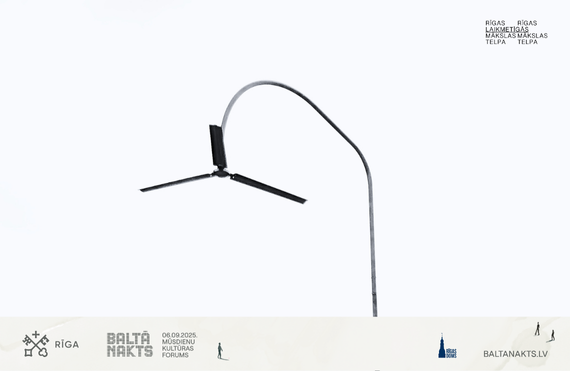Kristaps Ģelzis & Ģirts Bišs. PULPIT | Baltā nakts
06.09.2025.Kristaps Ģelzis & Ģirts Bišs
Pulpit
2013
The nearly seven-metre object featuring a ventilation fan mounted on the top of it is a joint project between the artist Kristaps Ģelzis and the composer Ģirts Bišs. The Pulpit was
conceived as a symbol of absolution and presents a way of salvation through confessing one’s sins via mobile phone.
‘Fans are set up in stuffy and hot places. A sinner lies between sticky bedsheets and stares at the ceiling where fan blades keep rotating relentlessly like the Samsara Wheel. The Apocalypse Now epic film by Francis Ford Coppola opens with a sequence of a ceiling fan chopping air, hauntingly reminding the occupant of the bed of Vietnam War helicopters and the jungle thicket inferno he has lived through. The Christian Church has accumulated centuries’ worth of experience in tending to the human soul. Contemporary art offers a contemporary take on confession: in addition to meditation, you can also confess your sins by sending the Pulpit a text message. And receive absolution. In the words of Martin Luther, ‘where there is forgiveness of sins, there is also life and salvation’. As you listen to a vocal piece by Ģirts Bišs set to a passage from Chapter Six of Matthew’s Gospel in Latin, you may perhaps find peace of mind. The Christian Church believes that sin yearns to remain anonymous: that is when it holds power over us.’ These words were written back in 2013 by Anna Iltnere.
In 2015, the Pulpit object brought a Purvītis Prize nomination to Kristaps Ģelzis and Ģirts Bišs. The work went on show in the exhibition by the 2015 Purvītis Prize shortlisted artists at the Arsenāls Exhibition Hall of the Latvian National Museum of Art.
About the Authors
One of the most vivid and interesting figures in the Latvian contemporary art history, Kristaps Ģelzis (1962) is an artist who is known for radical shifts in his expression and an enviable knack for always keeping the artistic intrigue alive. Ģelzis has a sensitive command of the symbolic elements inherent to the local context, interpreting them expertly in his art, as well as the courage it takes to be openly ironic about current social trends. Kristaps Ģelzis won the Purvītis Prize in 2011. He represented Latvia at the 54th Venice Biennale with his Artificial Peace. Contemporary Landscape show.
Ģirts Bišs (1967), a composer, also holds a master’s degree in audiovisual arts from the Vilnius Academy of Arts (2011) and has furthered his education at various international summer schools of art and music. Focusing mostly on electroacoustic composition, Ģirts Bišs writes original scores for film soundtracks; he also works in photography and visual arts. Bišs is the winner of a number of significant awards, including the 2005 Lielais Kristaps National Film Award in the Best Composer category.
Supported by: Riga City Municipality
